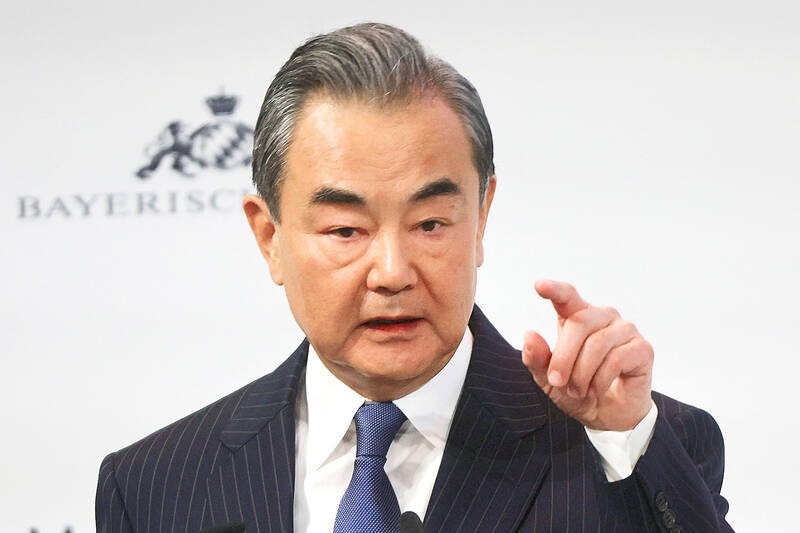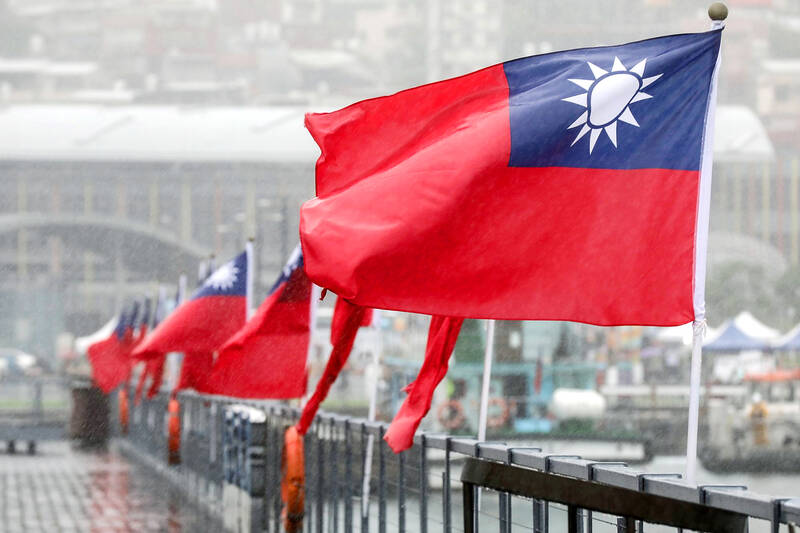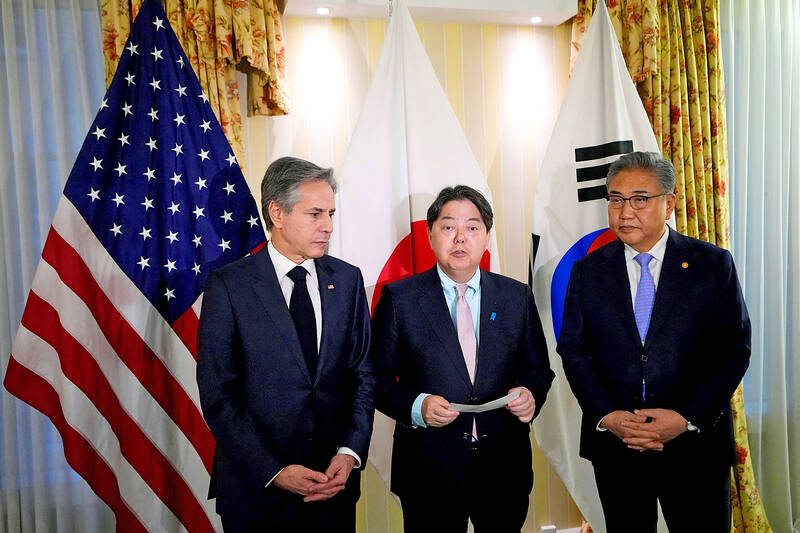The Mainland Affairs Council (MAC) yesterday protested against claim by China’s top diplomat Wang Yi (王毅) that Taiwan is part of China.
At the Munich Security Conference on Saturday, Wang, the Chinese Communist Party’s most senior foreign policy official, said that “Taiwan has been a part of China since ancient times. It is never a country and never will be a country.”
It is not China that wants to change the “status quo,” but those “separatists who advocate for Taiwan’s independence do,” he said, adding that calling for Taiwanese independence is incompatible with peace and stability across the Taiwan Strait.

Photo: Reuters
Only by opposing it and following the “one China” principle can peace across the Strait be maintained, he said.
Just as countries around the world call for Ukraine’s sovereignty and territorial integrity to be maintained, Chinese sovereignty and territorial integrity should be protected, he said, adding that “there shouldn’t be double standards on major issues.”
Using Taiwan’s official name, the MAC said in a statement yesterday that the Republic of China (ROC) is a sovereign nation that has never been and never will be a part of the People’s Republic of China.

Photo: I-Hwa Cheng, Bloomberg
The “status quo” across the Taiwan Strait is that the “two sides across the Strait do not belong to one another,” it said, adding that the “one China” principle is China’s attempt to belittle Taiwan and distort the truth.
China’s attempt to mislead other countries has never been recognized by the international community, the MAC said.
While the world jointly condemns Russia’s invasion of Ukraine, which began almost a year ago, there are heightened concerns about Taiwan’s security, it said.

Photo: Reuters
Beijing lacks the courage to condemn Russia’s aggression, and instead calls the global “consensus” against authoritarian expansionism “double standards,” which only adds to the international community’s doubts and opposition against it, it said.
The MAC called on Beijing to adjust its coercive position against Taiwan and take on the responsibility of maintaining regional security and improving cross-strait relations.
US Secretary of State Antony Blinken and Japanese Minister of Foreign Affairs Yoshimasa Hayashi in separate meetings with Wang on the sidelines of the Munich Security Conference reiterated the importance of peace across the Taiwan Strait.
Blinken, during an informal meeting with Wang, said that the US has not changed its “one China” policy, and underlined the importance of maintaining peace across the Taiwan Strait, the US Department of State said in a statement.
Blinken also reiterated US President Joe Biden’s position that the US would defend its values and interests, but does not want conflict with China or seek a new Cold War, adding that it is important for the two countries to maintain effective communication channels.
The Japanese Ministry of Foreign Affairs said that Hayashi and Wang talked for about 50 minutes, during which time Hayashi restated his nation’s position regarding “specific balloon-shaped flying objects” detected in Japan’s airspace, and demanded that intrusions into its airspace never happen again.
Japan is deeply concerned about the situation in the East China Sea, including the Diaoyutai Islands (釣魚台) in the East China Sea — known as the Senkaku Islands in Japan — and the frequent military actions taken by China and Russia around Japan, Hayashi said, adding that peace and stability in the Taiwan Strait is also important.
This story has been amended since it was first published.

INVESTIGATION: The case is the latest instance of a DPP figure being implicated in an espionage network accused of allegedly leaking information to Chinese intelligence Democratic Progressive Party (DPP) member Ho Jen-chieh (何仁傑) was detained and held incommunicado yesterday on suspicion of spying for China during his tenure as assistant to then-minister of foreign affairs Joseph Wu (吳釗燮). The Taipei District Prosecutors’ Office said Ho was implicated during its investigation into alleged spying activities by former Presidential Office consultant Wu Shang-yu (吳尚雨). Prosecutors said there is reason to believe Ho breached the National Security Act (國家安全法) by leaking classified Ministry of Foreign Affairs information to Chinese intelligence. Following interrogation, prosecutors petitioned the Taipei District Court to detain Ho, citing concerns over potential collusion or tampering of evidence. The

Seventy percent of middle and elementary schools now conduct English classes entirely in English, the Ministry of Education said, as it encourages schools nationwide to adopt this practice Minister of Education (MOE) Cheng Ying-yao (鄭英耀) is scheduled to present a report on the government’s bilingual education policy to the Legislative Yuan’s Education and Culture Committee today. The report would outline strategies aimed at expanding access to education, reducing regional disparities and improving talent cultivation. Implementation of bilingual education policies has varied across local governments, occasionally drawing public criticism. For example, some schools have required teachers of non-English subjects to pass English proficiency

NEGOTIATIONS: The US response to the countermeasures and plans Taiwan presented has been positive, including boosting procurement and investment, the president said Taiwan is included in the first group for trade negotiations with the US, President William Lai (賴清德) said yesterday, as he seeks to shield Taiwanese exporters from a 32 percent tariff. In Washington, US Trade Representative Jamieson Greer said in an interview on Fox News on Thursday that he would speak to his Taiwanese and Israeli counterparts yesterday about tariffs after holding a long discussion with the Vietnamese earlier. US President Donald Trump on Wednesday postponed punishing levies on multiple trade partners, including Taiwan, for three months after trillions of US dollars were wiped off global markets. He has maintained a 10 percent

TRADE: The premier pledged safeguards on ‘Made in Taiwan’ labeling, anti-dumping measures and stricter export controls to strengthen its position in trade talks Products labeled “made in Taiwan” must be genuinely made in Taiwan, Premier Cho Jung-tai (卓榮泰) said yesterday, vowing to enforce strict safeguards against “origin laundering” and initiate anti-dumping investigations to prevent China dumping its products in Taiwan. Cho made the remarks in a discussion session with representatives from industries in Kaohsiung. In response to the US government’s recent announcement of “reciprocal” tariffs on its trading partners, President William Lai (賴清德) and Cho last week began a series of consultations with industry leaders nationwide to gather feedback and address concerns. Taiwanese and US officials held a videoconference on Friday evening to discuss the